Uncover the roles of Michael and Gabriel, celestial beings shaping faith and destiny, and discover why their stories are crucial to understanding biblical narratives.
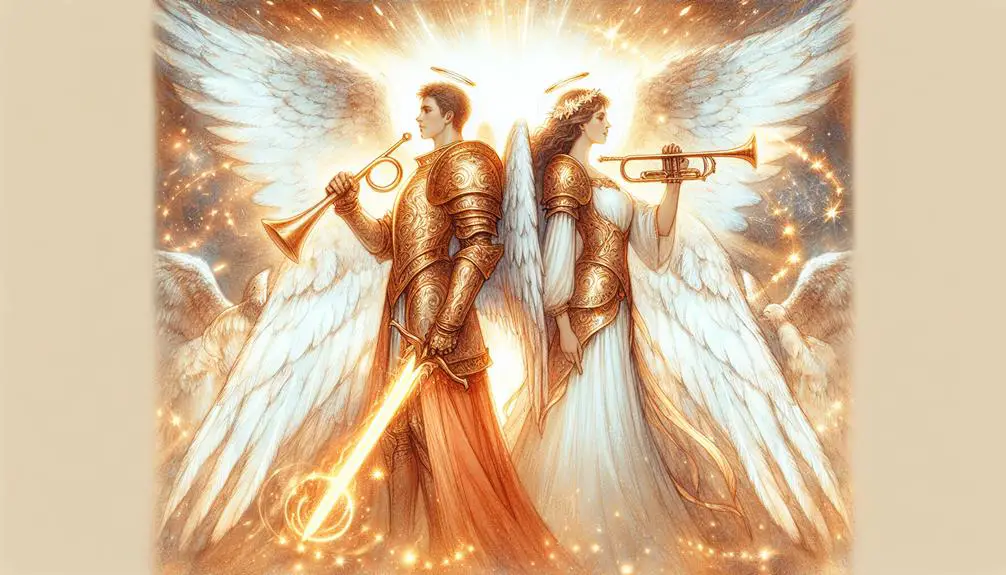
Michael and Gabriel in the Bible
In the tapestry of biblical narratives, Michael and Gabriel stand out as threads of gold, each playing pivotal roles in the spiritual realm and human history. You've probably heard their names, but do you truly understand their significance?
Michael, often depicted as a warrior, serves as a protector, facing down evil with unwavering courage. Gabriel, on the other hand, bridges heaven and earth, delivering messages that have altered the course of lives and nations. Their stories intertwine with humanity's, offering insights into courage, faith, and the power of divine intervention.
As we explore their roles, you'll find their impact on both celestial battles and human hearts is profound and worth a closer look.
Key Takeaways
- Michael is depicted as the Protector Archangel, symbolizing justice, virtue, and courage in heavenly battles.
- Gabriel serves as the Messenger Archangel, delivering divine messages and marking pivotal historical transitions.
- Both archangels play crucial roles in shaping human destiny and spiritual development through divine guidance.
- Their legacy influences theological thought, cultural narratives, and promotes reflection on divine-human interactions.
Who Are Michael and Gabriel?
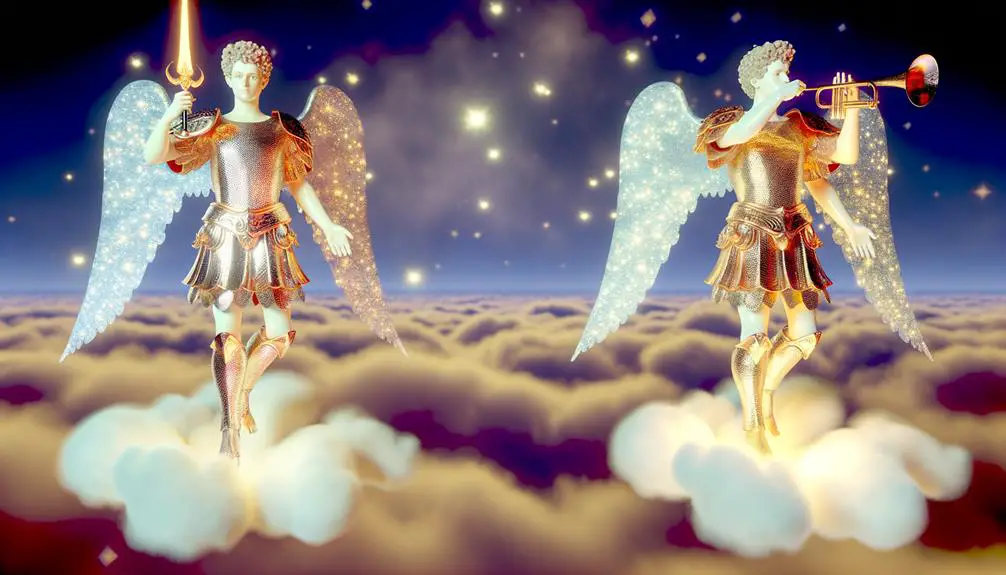
In biblical lore, Michael and Gabriel stand out as two of the most distinguished archangels, each playing pivotal roles within the spiritual hierarchy and divine narrative. You'll find their presence not just as messengers of God but as key figures enacting His will across various scriptures. Their roles are deeply embedded in the angelic hierarchy, marking them as superior celestial beings endowed with specific duties.
Gabriel, often depicted with a trumpet, is primarily seen as the messenger of God. His celestial duties are vast but focus on conveying God's messages to humanity. This role is crucial in biblical events, such as announcing the births of John the Baptist and Jesus Christ to their parents. Gabriel's function within the angelic hierarchy emphasizes communication between the divine and the mortal, serving as a bridge that conveys God's will and intentions.
On the other hand, while discussing Michael in this context without veering into his protective aspects might seem limiting, it's essential to note his role as a leader within the angelic hierarchy. Without touching on specifics that pertain to his protective duties, it's acknowledged that Michael holds a position of great authority and respect among the angels. His celestial duties, though varied and not limited to protection, underscore his importance in executing God's justice and maintaining order within the spiritual realm.
Both archangels, through their distinct celestial duties, reinforce the structure of the angelic hierarchy, ensuring that the divine will is manifested and upheld in the spiritual and human worlds. Their roles, deeply interwoven with the fabric of biblical narratives, highlight their significance in the spiritual domain.
Michael: The Protector Archangel
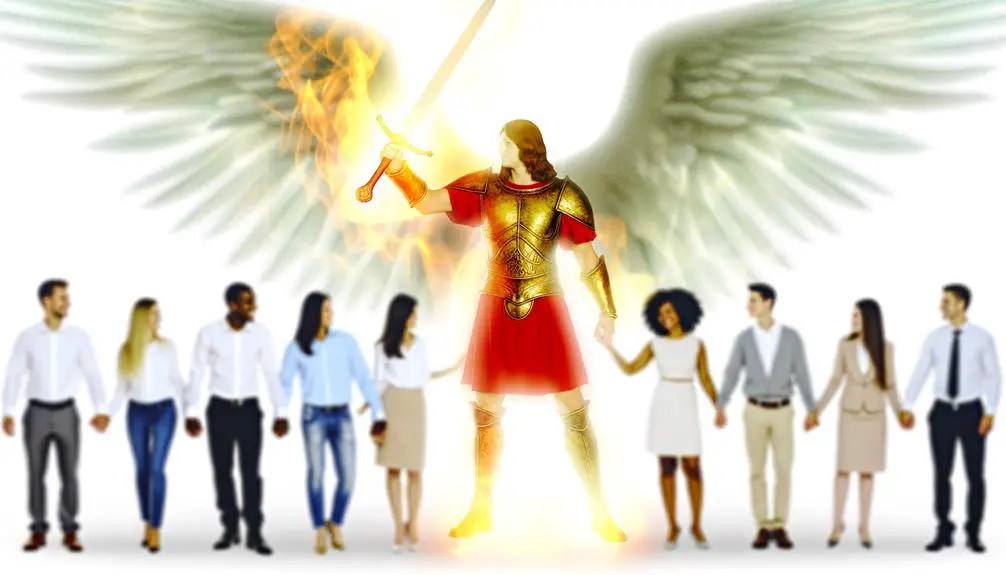
Delving into the role of Michael within the spiritual hierarchy, it's clear he serves as the formidable protector archangel, a position underscored by his authoritative and combative engagements in the biblical narrative. His pivotal role isn't merely a testament to his strength but also to his unwavering commitment to justice and protection. Analyzing Michael's battles and the lore surrounding him reveals a complex figure, central to the cosmic order and spiritual warfare.
To understand Michael's significance, consider the following aspects of his character and actions:
- Leadership in Heavenly Battles: Michael is often depicted leading the forces of heaven against the rebellion of fallen angels, showcasing not just his martial prowess but also his strategic acumen.
- Protector of the Faithful: Throughout various texts, Michael emerges as a guardian of the faithful, intervening in times of peril and guiding souls in the afterlife.
- Confrontation with Evil Forces: His confrontations, most notably with Satan, symbolize the ongoing struggle between good and evil, with Michael serving as a bulwark against darkness.
- Embodiment of Justice and Virtue: Beyond his role in battle, Michael is seen as a figure of moral rectitude, embodying virtues that the faithful are encouraged to emulate.
Michael's narrative within the archangel lore isn't just about the battles he fights but also about the values he represents. His story encourages believers to stand firm in the face of adversity, holding onto faith and righteousness. Through an analytical lens, Michael's role as the protector archangel is both a source of inspiration and a blueprint for spiritual resilience.
Gabriel: The Messenger Archangel
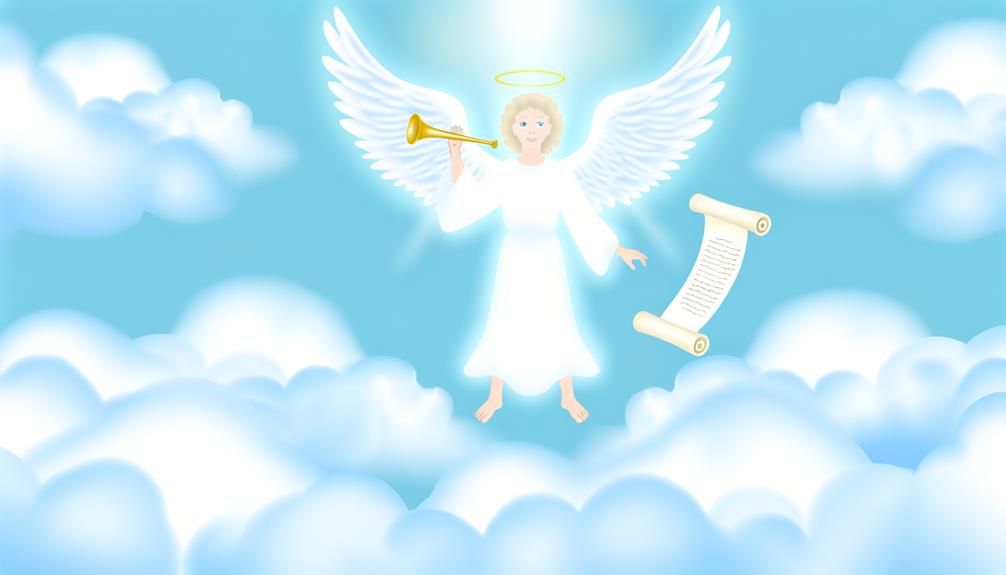
As you explore Gabriel's role in the biblical narrative, you'll uncover his pivotal appearances and the significance of his messages. His involvement in key annunciations underscores a unique position among celestial beings, emphasizing his role as a divine messenger.
Analyzing Gabriel's symbolism and interpretation sheds light on the broader theological implications of his actions within the scriptural context.
Gabriel's Biblical Appearances
Gabriel, known as the Messenger Archangel, makes pivotal appearances in biblical narratives, delivering messages of divine significance with profound implications for humanity. His role as a communicator between the divine and the mortal is underscored through:
- Interpretations of complex dreams that often foretell significant events, guiding key figures towards understanding God's will.
- The sounding of Gabriel's horn, symbolizing the announcement of crucial moments in biblical prophecy.
- Delivering messages that alter the course of individuals' lives and, by extension, the fate of entire nations.
- Acting as a herald of change, his interventions mark pivotal transitions in biblical history.
Gabriel's appearances aren't just incidental; they serve as foundational moments where the divine intersects with the human, emphasizing his critical role in the unfolding narrative of faith and destiny.
Role in Annunciations
Building on his role as a divine messenger, Gabriel's interventions in annunciations are pivotal, showcasing his critical function in conveying God's will to humanity through specific, life-altering revelations. His use of angelic languages and divine interventions exemplifies a bridge between the divine and the earthly, marking moments of significant theological and historical shifts.
Aspect |
Significance |
Example |
|---|---|---|
Angelic Languages |
Facilitates direct divine communication |
Annunciation to Mary |
Divine Interventions |
Alters the course of human history |
Birth of John the Baptist |
Human Response |
Reflects faith and the complexity of reception |
Zechariah's disbelief |
Theological Impact |
Highlights God's active role in human salvation |
Messiah's coming |
Historical Shift |
Sets the stage for Christianity's foundational events |
Jesus's birth |
Through these annunciations, Gabriel's role transcends mere messaging, embedding deeper theological and historical significance in these divine encounters.
Symbolism and Interpretation
Why does Gabriel, known as the Messenger Archangel, hold such profound symbolic significance in religious texts? Analyzing Gabriel's role, you uncover layers of meaning that transcend mere narratives:
- Angelic hierarchy: Gabriel's position highlights a structured cosmos, where divine messages bridge heaven and earth.
- Cultural depictions: From Renaissance paintings to modern films, Gabriel's image embodies purity and divine will, influencing countless artworks.
- Interpretation of dreams: Gabriel's communication isn't just verbal; it extends to the realm of dreams, suggesting a deeper, subconscious connection with the divine.
- Transition and announcement: Gabriel's announcements often signal pivotal moments, reflecting life's transitions and the profound impact of divine intervention.
These elements together paint a complex picture of Gabriel, weaving him into the fabric of faith and culture.
Biblical Appearances of Michael
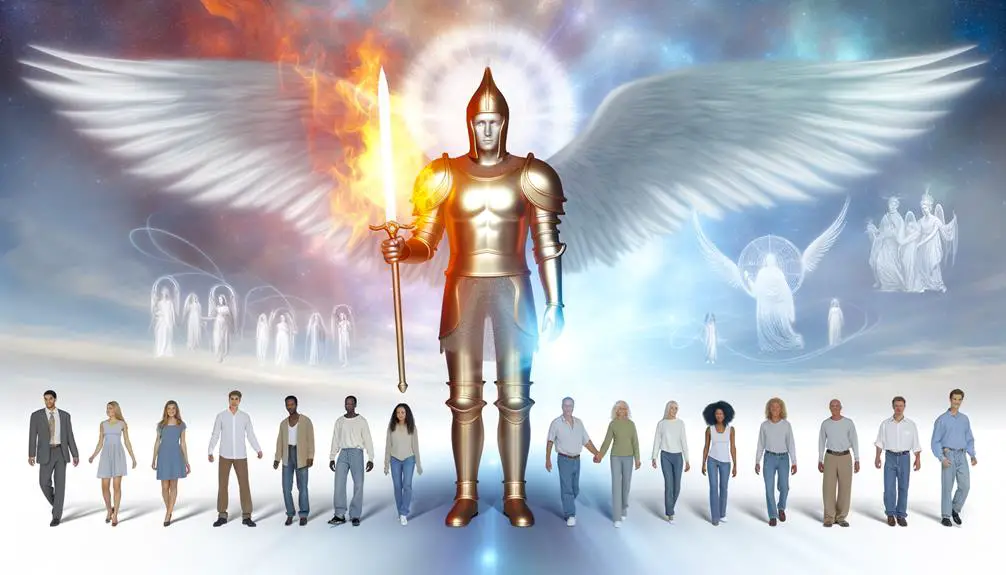
In the Bible, Michael is depicted as a warrior archangel who plays crucial roles in various scriptural narratives, showcasing his significance in the celestial hierarchy. His appearances underscore his vital role in spiritual warfare, positioning him as a key figure within the angelic hierarchy. Michael emerges not just as a protector of the faithful but also as a formidable opponent against forces of evil.
One of the most compelling scriptural references to Michael's role in spiritual warfare is found in the Book of Daniel, where he's described as the great prince who protects the people of Israel. This depiction underscores the belief in Michael's powerful intercessory role on behalf of God's people, highlighting his prominence in the heavenly realms. His intervention in the spiritual battles that influence the material world underscores the interconnectedness of the celestial order with human affairs.
Furthermore, the New Testament's Book of Revelation presents Michael leading the forces of heaven against the dragon, symbolizing Satan, in a cosmic battle that epitomizes the struggle between good and evil. This portrayal not only reinforces Michael's status as a chief military leader among angels but also illustrates the broader theme of spiritual warfare that permeates biblical scripture.
Analyzing these appearances, it's clear that Michael's role extends beyond that of a mere messenger or servant. He's a linchpin in the unfolding of divine justice and the maintenance of cosmic order. Through his interventions, the Bible conveys a profound message about the power of faith and the omnipresent protection offered by the divine to its adherents in the face of adversity.
Gabriel's Announcements in Scripture
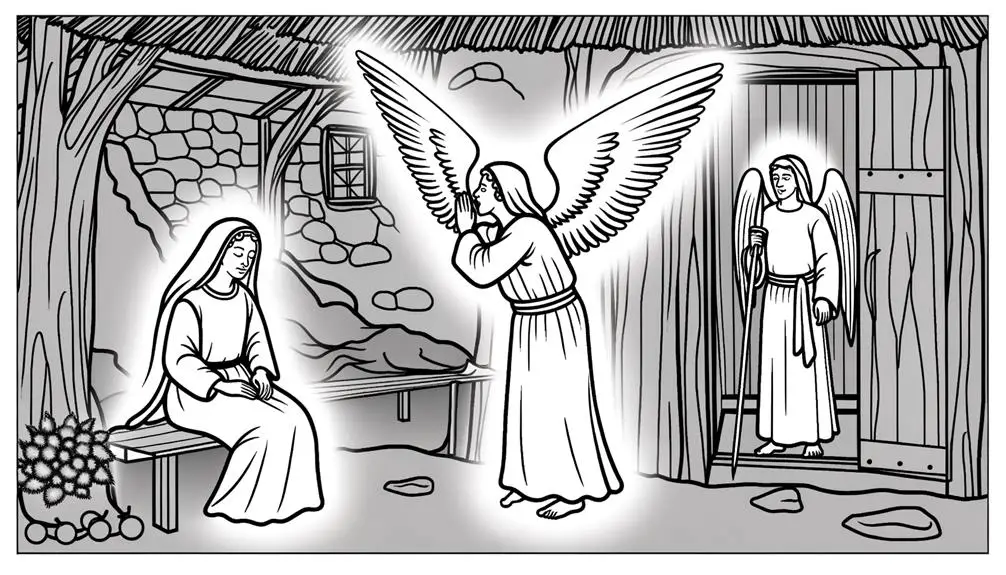
Just as Michael plays a pivotal role in spiritual warfare, Gabriel stands out for his unique mission of delivering divine announcements in scripture. His appearances are pivotal moments of divine intervention, where his angelic characteristics are on full display, serving as a bridge between the divine realm and humanity. Analyzing Gabriel's announcements, you uncover a pattern of direct, transformative messages that alter the course of human history.
- To Daniel (Daniel 8:15-26; 9:21-27): Gabriel provides insight into future events, revealing the timeline for the Messiah's arrival. His detailed explanation of the vision Daniel received exemplifies his role as a divine messenger, tasked with clarifying complex prophecies.
- To Zechariah (Luke 1:11-20): Announcing the birth of John the Baptist, Gabriel demonstrates divine foresight and the intentional preparation for the coming of Christ. His interaction with Zechariah underscores the seriousness of divine messages, emphasizing belief in the impossible made possible through divine intervention.
- To Mary (Luke 1:26-38): Perhaps his most famous announcement, Gabriel informs Mary of her role as the mother of Jesus. This moment highlights the intersection of human free will and divine plan, showcasing Gabriel's role in facilitating key events in Christian theology.
- To the Shepherds (Luke 2:8-14): While traditionally attributed to Gabriel, this announcement of Jesus' birth to the shepherds celebrates the joy and global significance of the event, reinforcing the theme of divine intervention in human affairs.
Through these announcements, Gabriel's role as a divine messenger is crystal clear, his actions steeped in the purpose of bridging the celestial and the terrestrial, embodying the very essence of angelic characteristics in his unwavering obedience to God's will.
Symbolism and Roles
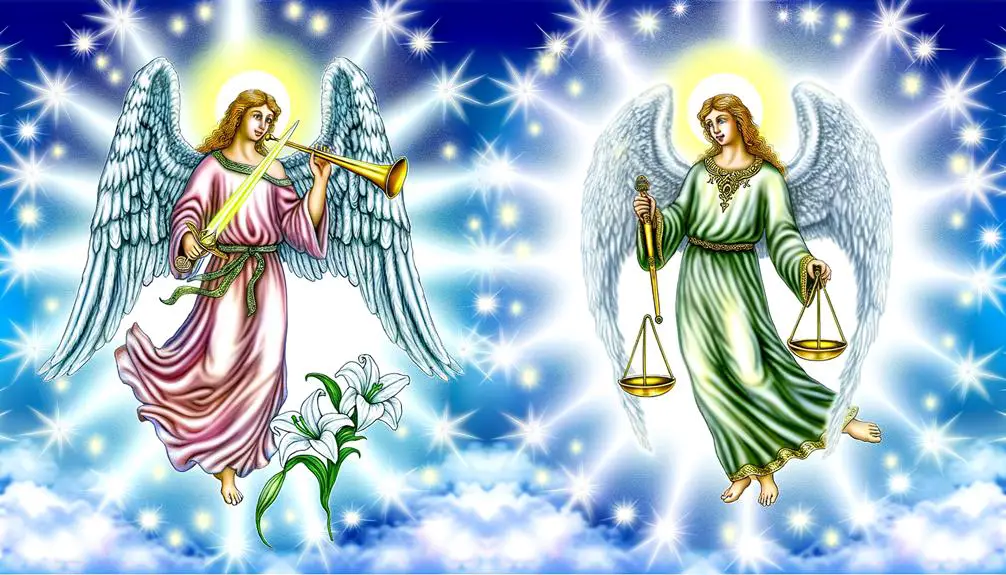
Delving into the symbolism and roles of Michael and Gabriel reveals their profound significance within biblical narratives, embodying divine authority and the nuanced complexities of their celestial missions. Michael, often depicted as a warrior, stands as a formidable figure in spiritual warfare, representing courage, protection, and the fight against darkness. His leadership in angelic hierarchies underscores an organized, strategic approach to celestial battles, emphasizing the importance of strength and valor in the face of evil.
Gabriel, on the other hand, symbolizes communication and revelation. His role within the angelic hierarchies is less about warfare and more about serving as a divine messenger, bridging the gap between heaven and earth. Gabriel's announcements to key figures in the Bible highlight the critical importance of divine messages in guiding and shaping human history.
The contrasting roles of Michael and Gabriel within spiritual warfare and divine communication reflect a balanced approach to heavenly intervention in human affairs. Michael's role underscores the ongoing battle between good and evil, a theme that resonates deeply within Christian theology. Gabriel's role, in contrast, illuminates the importance of hope, guidance, and the revelation of God's will to humanity.
In analyzing their symbolism and roles, it becomes clear that Michael and Gabriel aren't merely characters in a story. They embody the multifaceted nature of divine intervention, representing both the warrior aspect of God's protection and the gentle guidance of His messages. Through their actions and missions, they serve as pillars within the angelic hierarchies, each playing a pivotal role in the spiritual warfare that underpins biblical teachings.
Their Impact on Humanity
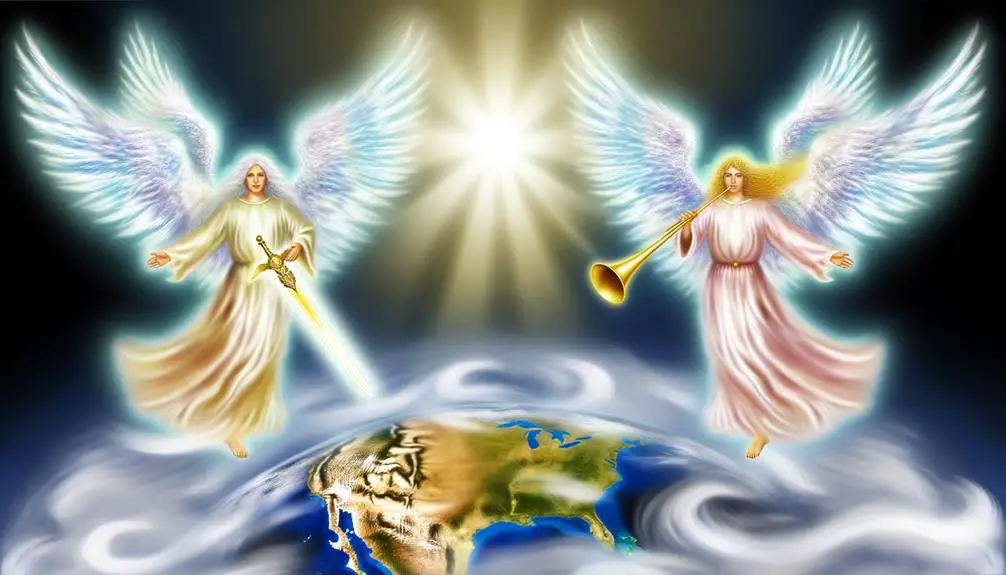
You observe that Michael and Gabriel's roles transcend mere celestial presence; they actively shape human destiny through guiding choices and delivering divine messages.
Their interventions, as chronicled in biblical narratives, serve as a conduit for spiritual growth among believers, fostering a deeper comprehension of divine will.
This dynamic interplay between heavenly beings and human affairs underscores the profound impact they wield on the spiritual development of humanity.
Guiding Human Choices
Michael and Gabriel have significantly influenced human choices throughout biblical narratives, shaping the course of humanity's spiritual and moral development. Their roles in guiding humans through ethical dilemmas showcase the profound impact of angelic interventions.
- Angelic interventions often occur at critical junctures, providing clarity and direction in moments of uncertainty.
- Ethical dilemmas faced by biblical figures were frequently mitigated by insights or actions from Michael or Gabriel, underscoring their importance in moral decision-making.
- Their influence extends beyond mere guidance, fostering a deeper connection between humans and the divine.
- Through their interventions, Michael and Gabriel have helped shape the moral compass of countless individuals, highlighting the symbiotic relationship between divine beings and human morality.
In analyzing their impact, it's clear that their contributions are indispensable to understanding the evolution of ethical thought within biblical contexts.
Delivering Divine Messages
Building on their role in guiding ethical decisions, Gabriel and Michael also serve as pivotal messengers of God, profoundly impacting humanity by conveying divine directives that shape the spiritual landscape.
Their messages, often enveloped in angelic languages and accompanied by supernatural phenomena, transcend mere verbal communication. These instances not only underscore their celestial authority but also bridge the divine-human divide, enabling a unique interaction between the spiritual and earthly realms.
Through such engagements, Gabriel and Michael facilitate a deeper understanding of divine will, emphasizing the significance of obedience and faith. Their role in delivering these messages isn't just a testament to their position in the celestial hierarchy but also a reflection of God's direct intervention in human affairs, guiding individuals and communities towards a divinely ordained path.
Inspiring Spiritual Growth
Through their divine missions, Gabriel and Michael significantly contribute to human spiritual growth, fostering a deeper connection between individuals and the divine realm. Their roles in biblical narratives not only illuminate the path of faith but also offer profound insights into the dynamics of spiritual warfare and the significance of angel encounters.
- Angel Encounters: Serve as a catalyst for spiritual awakening and personal transformation.
- Spiritual Warfare: Equip believers with the understanding to navigate the challenges posed by spiritual adversaries.
- Guidance and Protection: Emphasize the protective role of angels in guiding individuals towards spiritual enlightenment.
- Faith Reinforcement: Strengthen believers' faith through direct intervention and support in times of need.
Their influence extends beyond mere stories, shaping the spiritual journey of countless individuals throughout history.
Reflections on Their Legacy
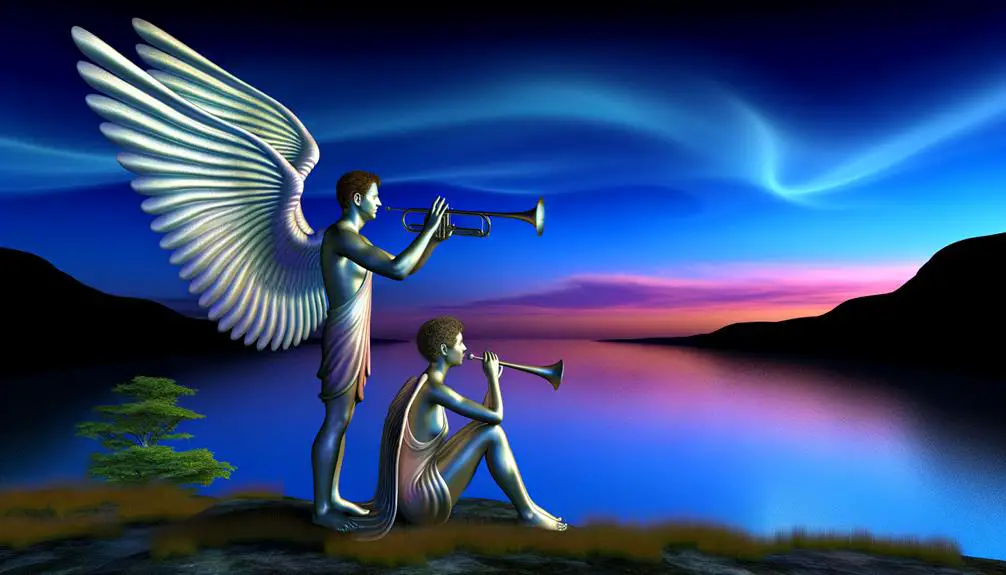
In assessing the legacies of Michael and Gabriel, it's imperative to recognize their profound influence on theological thought and cultural narratives across centuries. Their stories intertwine with the very fabric of angelic hierarchy and spiritual warfare, offering rich insights into their roles as divine messengers and warriors.
Michael, often depicted as a supreme warrior, plays a pivotal role in spiritual battles, symbolizing the power of good prevailing over evil. His presence in scripture reinforces the concept of spiritual warfare, where forces of good combat evil, reflecting a cosmic order maintained by divine intervention.
Gabriel, on the other hand, brings messages of crucial importance to humanity, facilitating God's plan. His announcements to Mary and Daniel highlight the interconnectedness of divine messages with human destiny, showcasing an angelic duty that extends beyond the celestial to directly influence earthly affairs.
Their legacies transcend religious texts, permeating art, literature, and popular culture, thus becoming symbols of faith, strength, and hope for many. You can see their influence in the portrayal of angels as protectors and messengers, embodying the virtues of courage and obedience to divine will.
Moreover, Michael and Gabriel's stories encourage a deeper reflection on the nature of divine interaction with the world. They prompt you to consider the balance between predestination and free will, the presence of good and evil, and the complex relationship between the divine and the human.
Frequently Asked Questions
How Have Interpretations of Michael and Gabriel's Roles Evolved in Different Christian Denominations Over the Centuries?
You've likely noticed how interpretations of angelic roles have shifted across denominations over time. Delving into the angelic hierarchy, you'll see that denominational doctrines play a crucial part in these changes.
These doctrines shape how each tradition understands and values the contributions of key figures within this hierarchy. As you explore further, you'll find that the roles of prominent angels have been reimagined in fascinating ways to align with evolving theological insights.
Are There Any Notable Artistic Representations of Michael and Gabriel From the Renaissance Period That Significantly Influenced the Public's Perception of These Archangels?
You're diving into a sea of Renaissance symbolism, where the artistic techniques of the era bring figures to life.
During the Renaissance, artists like Raphael and Michelangelo painted Michael and Gabriel with such divine finesse and detail that their representations became iconic.
These artworks didn't just capture the imagination; they sculpted the public's perception of these figures, embedding them into cultural consciousness with the stroke of a brush and the blend of a palette.
In What Way Do Other Religious Traditions, Such as Islam or Judaism, Depict Michael and Gabriel, and How Do These Portrayals Differ From Christian Interpretations?
In Islamic interpretations and Judaic perspectives, Michael and Gabriel hold distinct roles that diverge from Christian views. You'll find in Islam, they're deeply involved in human affairs and prophetic revelations, contrasting with their more martial and messenger roles in Christianity.
Judaism portrays them with unique symbolic duties, emphasizing their divine missions. These differences highlight how religious contexts shape the archangels' identities, offering a nuanced understanding beyond mere protective or communicative functions.
Can Parallels Be Drawn Between the Stories of Michael and Gabriel in the Bible and Figures or Deities in Ancient Mythologies Outside of the Abrahamic Religions?
Ironically, without diving into Abrahamic texts, you'll find that mythological archetypes similar to Michael and Gabriel pop up across cultures. Through comparative mythology, it's clear these figures aren't unique creations but part of a broader tapestry.
Ancient mythologies outside the Abrahamic faiths are rich with parallels, suggesting these archangels share roots with deities and heroes from distant legends, reflecting universal themes of guidance, protection, and moral judgment in human storytelling.
Have There Been Any Significant Archaeological Discoveries, Such as Ancient Texts or Artifacts, That Have Provided New Insights or Perspectives on the Roles of Michael and Gabriel in Early Christian Communities?
You've stumbled upon a fascinating inquiry about the impact of archaeological methods and textual criticism on understanding early Christian communities. These tools have indeed unearthed texts and artifacts, offering fresh insights into religious figures' roles.
However, specific discoveries directly shedding light on Michael and Gabriel's roles are scarce. The broader application of these methods continues to refine our grasp of ancient beliefs and practices, enriching our comprehension of historical religious narratives.
Conclusion
In essence, Michael and Gabriel stand as towering pillars in biblical narratives, embodying the divine will through protection and proclamation. Their celestial roles weave a tapestry of guidance and revelation across human history, marking them as indelible symbols of hope and divine intervention.
As you reflect on their legacy, consider how they've been a beacon, guiding humanity through the tempests of time. Their impact, deeply etched into the spiritual consciousness, continues to inspire and uplift, bridging the divine and the mortal.

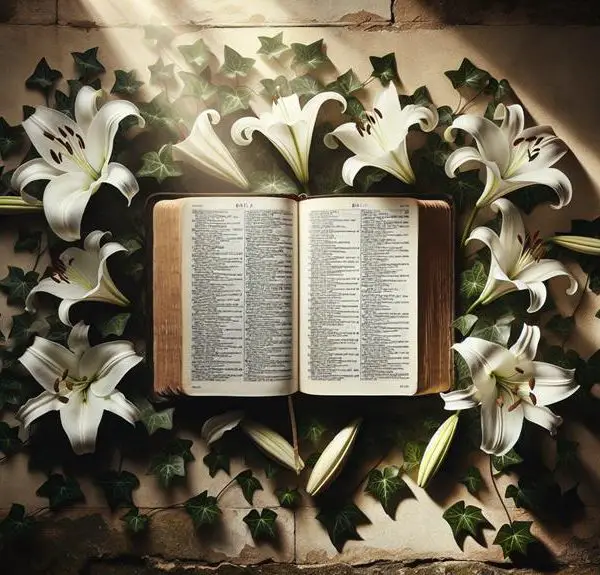
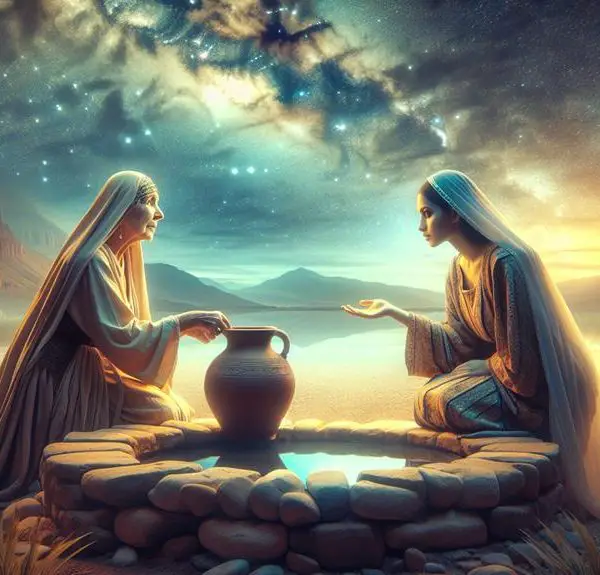
Sign up